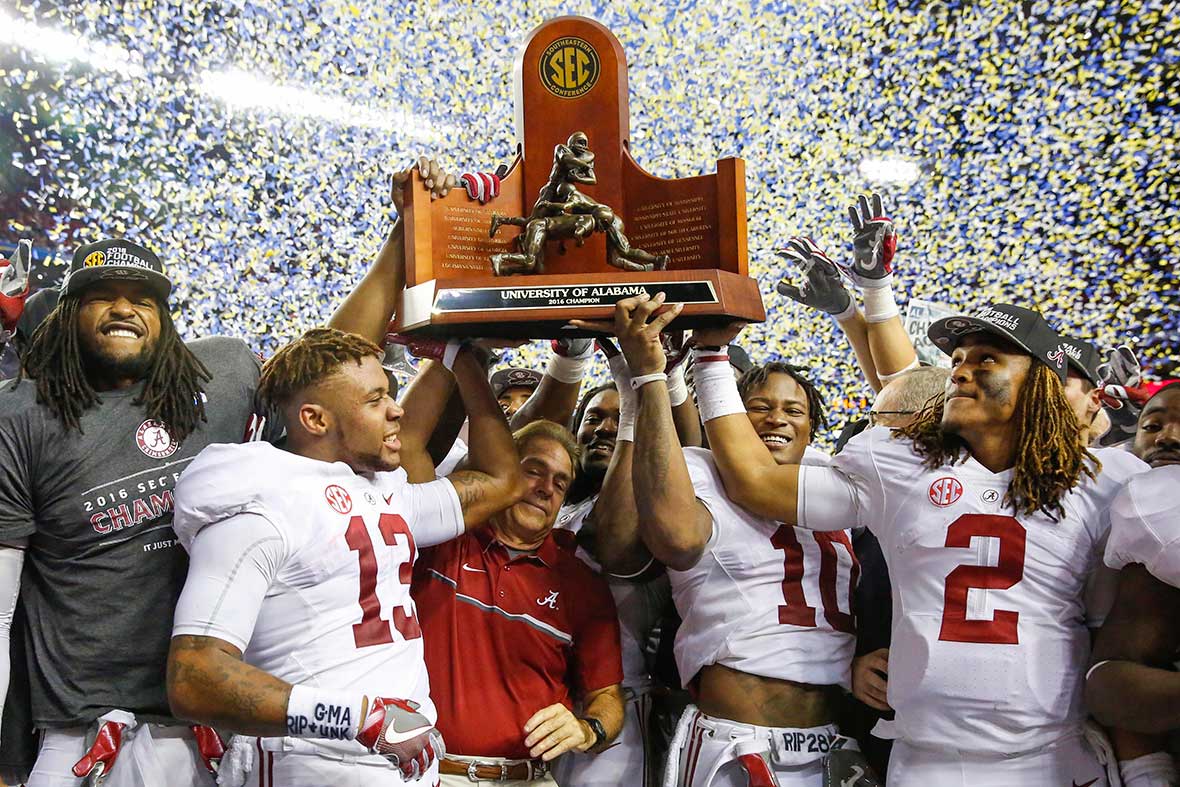SEC and NCAA Taking Bold Steps to Cut Down on Length of College Football Games
And if you sat down through what's supposed to be a 20-minute halftime and thought to yourself, that went a bit longer than 20 minutes, you're not alone in that situation. Again, the NCAA and SEC have noticed.
And if you sat down through what's supposed to be a 20-minute halftime and thought to yourself, that went a bit longer than 20 minutes, you're not alone in that situation. Again, the NCAA and SEC have noticed.
 Dec 3, 2016; Atlanta, GA, USA; Alabama Crimson Tide head coach Nick Saban celebrates winning the trophy with his team after the SEC Championship college football game against the Florida Gators at Georgia Dome. Alabama defeated Florida 54-16. Mandatory Credit: Jason Getz-USA TODAY Sports
Dec 3, 2016; Atlanta, GA, USA; Alabama Crimson Tide head coach Nick Saban celebrates winning the trophy with his team after the SEC Championship college football game against the Florida Gators at Georgia Dome. Alabama defeated Florida 54-16. Mandatory Credit: Jason Getz-USA TODAY SportsAs we know the average length of an SEC football game last season was 3 hours and 26 minutes. The national average being 3 hours and 24 minutes. The conference decision was to bring the number down.
"We've asked before, what is the optimal time? And nobody's answered that question yet," SEC coordinator of officials Steve Shaw said during a presentation to the media at the SEC meetings last week. "If you ask the NFL, they have answers for that. But their game looks so much alike game-to-game, they're always in a tight window. Ours are not."
The latest odds have been released, so who has the best shot at becoming the 2017 College Football National Champion?
Indeed, while the NFL and college both manager four 15-minute quarters, NFL games are shorter, and intentionally so at the pro level. They want this game at 1 p.m. ET games to finish in time for people to see the beginning of those later games, which star around 4:15 p.m. The college schedule on Saturdays is a bit less well-disciplined, with each conference on its own TV contract, and ESPN - which has the most TV involvement - able to bounce those games around on its various channels.
Still, the NCAA is concerned about its game length, but not enough that it's changing the two things that differentiate it from the NFL - stopping the clock on first downs and a 20-minute halftime, versus a 12-minute halftime.
So now after the last play of the half, the referee will make sure there are no flags, no replay review coming, etc.
When it comes to halftime, Shaw said there's an acknowledgement that there has been too much lollygagging. The concern is that officials have gotten carried away from starting the 20-minute halftime clock immediately, either because they're waiting on the coaches' end of match interview, or the game manager says they have two bands going, e.t.c. therefore, halftimes often been stretching to 23 or 24 minutes.
"And then we're going to crank the 20-minute [clock]," Shaw said.
When the 20 minutes are up, kickoff will quickly follow. Hopefully within seconds of that 20-minute clock running out.
"I really believe if our officials work well with our TV partners, and we do well with the halftime component, we'll whittle that down," Shaw said.
Then there's first downs, and the clock winding quickly afterwards. Shaw said there will be a re-emphasis on re-starting the clock when the center judge puts the ball down to be snapped. Research showed they had also delayed a bit there.
It's not just there: Shaw said referees have been told to be "actively consistent" in restarting the game clock after the substitution process.
"We're going to keep the game moving," Shaw said.
How much time will be saved overall with these measures? Shaw said the thinking is it will cut down five or six minutes.
So what about the length of commercial breaks, which fans complain about? That's out of the control of the officials.
If you've been to games, you may notice an official in a red hat who signals to the referee when TV has come out of commercial, meaning the game can restart. The referee simply cannot end the commercial break and restart the game.
The referee does have the discretion to keep the game going rather than going to a TV timeout, in some cases where flow of the game is important.
"If there's a momentum play, the referee can look at the red hat and say, no," Shaw said. "Let's say you have a punt. The referee gets ready for play, gets his count, and I would always sneak a peak at the red hat and he would say, ‘I want a timeout.' But we would get a big punt return and I'll say to him, Nope we're going, we're staying.
"But once it goes to TV, our TV liaison has total control."
SEC and NCAA Taking Bold Steps to Cut Down on Length of College Football Games to SEC Football





New! Facebook Comments
Leave a comment about this article in the box below and share it with your Facebook friends.